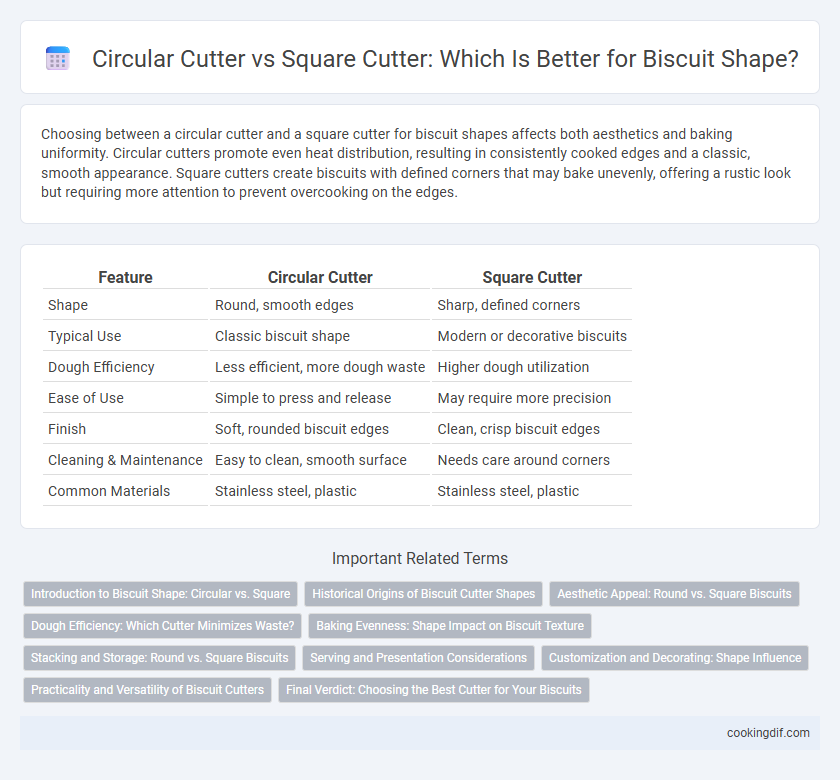Choosing between a circular cutter and a square cutter for biscuit shapes affects both aesthetics and baking uniformity. Circular cutters promote even heat distribution, resulting in consistently cooked edges and a classic, smooth appearance. Square cutters create biscuits with defined corners that may bake unevenly, offering a rustic look but requiring more attention to prevent overcooking on the edges.
Table of Comparison
| Feature | Circular Cutter | Square Cutter |
|---|---|---|
| Shape | Round, smooth edges | Sharp, defined corners |
| Typical Use | Classic biscuit shape | Modern or decorative biscuits |
| Dough Efficiency | Less efficient, more dough waste | Higher dough utilization |
| Ease of Use | Simple to press and release | May require more precision |
| Finish | Soft, rounded biscuit edges | Clean, crisp biscuit edges |
| Cleaning & Maintenance | Easy to clean, smooth surface | Needs care around corners |
| Common Materials | Stainless steel, plastic | Stainless steel, plastic |
Introduction to Biscuit Shape: Circular vs. Square
Circular biscuit cutters create traditional, evenly shaped cookies that bake uniformly, promoting consistent texture and appearance. Square biscuit cutters offer a modern alternative, producing biscuits with straight edges ideal for decorative patterns and stacking. Choosing between circular and square shapes influences baking time, presentation, and application in recipes.
Historical Origins of Biscuit Cutter Shapes
Biscuit cutter shapes have evolved from traditional forms influenced by cultural preferences and baking techniques dating back to the 18th century. Circular cutters gained prominence due to their ease of use and ability to promote even rising by minimizing edges, while square cutters were initially favored in certain regions for their efficient dough usage and distinctive rustic appearance. Historical baking manuals reveal that the choice between circular and square cutters often reflected regional baking customs and available tools rather than purely aesthetic considerations.
Aesthetic Appeal: Round vs. Square Biscuits
Round biscuit cutters create a classic, smooth edge that enhances the traditional aesthetic appeal, making the biscuits look soft and inviting. Square cutters produce sharp, defined corners, offering a modern and more structured appearance that stands out on a plate. Choosing between circular and square cutters depends on the desired presentation style, where round shapes evoke warmth and familiarity, while square shapes convey precision and contemporary design.
Dough Efficiency: Which Cutter Minimizes Waste?
Circular cutters typically maximize dough efficiency by minimizing waste due to their ability to nest closely together during cutting, reducing leftover scrap dough. Square cutters often result in more dough waste because their sharp corners create gaps when arranged on the dough sheet. Selecting a circular cutter optimizes material usage and reduces the amount of dough discarded in biscuit production.
Baking Evenness: Shape Impact on Biscuit Texture
Circular cutters promote more even baking due to the uniform heat distribution around the rounded edges, resulting in consistent biscuit texture and crispness. Square cutters, with their sharp corners, tend to create uneven baking zones where corners may overcook or brown faster than the center. This shape impact affects overall biscuit texture, making circular cutters preferable for achieving a balanced, tender crumb.
Stacking and Storage: Round vs. Square Biscuits
Square biscuit cutters create biscuits with flat edges that stack more efficiently, maximizing storage space in containers and packaging. Circular cutters produce round biscuits that can shift and slide during stacking, leading to potential breakage or wasted space. Optimizing biscuit shape with square cutters enhances overall packaging density and reduces product damage during transportation.
Serving and Presentation Considerations
Choosing between a circular cutter and a square cutter for biscuit shapes significantly affects serving and presentation, as circular biscuits provide a classic, uniform appearance that appeals to traditional settings and facilitate even baking. Square biscuits offer a modern, geometric aesthetic suitable for contemporary presentations, allowing for efficient stacking and creative plating arrangements. The choice of cutter influences not only visual appeal but also portion control and ease of handling during serving.
Customization and Decorating: Shape Influence
Circular biscuit cutters provide a traditional, uniform shape ideal for consistent baking and easy decorating, allowing for smooth, continuous designs like swirls or floral patterns. Square cutters offer enhanced customization by creating unique edges and corners that serve as distinct canvases for intricate patterns and personalized decoration, enabling more creative freedom. The choice between circular and square shapes influences the visual appeal and thematic presentation of biscuits, impacting both decoration style and consumer perception.
Practicality and Versatility of Biscuit Cutters
Circular biscuit cutters offer superior practicality by creating uniform shapes ideal for even baking and easy stacking, while square cutters provide versatility in creating unique presentations and maximizing dough usage with minimal waste. Both shapes facilitate efficient dough cutting, but circular cutters are favored in traditional baking for consistent rise and texture. Square cutters excel in creative recipes where space-saving and distinctive aesthetics are priorities.
Final Verdict: Choosing the Best Cutter for Your Biscuits
Selecting the ideal biscuit cutter depends on the desired final appearance and baking consistency; circular cutters provide classic, even shapes that promote uniform rising and texture, while square cutters offer a unique presentation with more surface area for toppings or fillings. Professional bakers often prefer circular cutters for their ability to minimize dough waste and ensure consistent biscuit height. For home bakers seeking versatility and aesthetic appeal, square cutters can create visually interesting biscuits, making the choice a balance between tradition and creativity.
Circular cutter vs square cutter for biscuit shape Infographic

 cookingdif.com
cookingdif.com